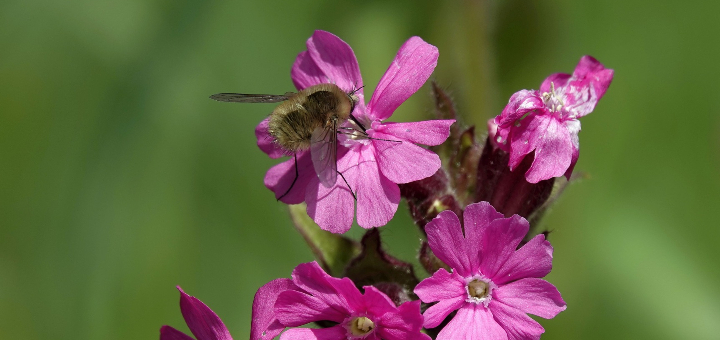
 Image credit: Pixabay.com (2019), CC0/PD[/caption]
This summer, my young grandson Colin and I heard bumblebees buzzing in a flowering bush near the house. Children, as you probably have noticed, have a way of slowing us down in our busy lives, of showing us little miracles of nature. On this sunny morning, I contemplated the interaction of a child and a bumblebee. As you will see, bees are a good source of meditation.
I noticed that Colin watched intently, but knew enough to keep his distance. I noticed that the bumblebee was completely absorbed in the task at hand. It was not distracted by the little boy watching nearby. Both stayed focused on their work. The bee trusted Colin and Colin trusted the bee. Nobody got hurt. Peace reigned amidst the fragrant pink blossoms.
This encounter caused me to reflect on the writings of St. Francis de Sales (1567-1622), author of the spiritual classic, Introduction to the Devout Life. Before Mass, I often will pull out a small pamphlet containing his wisdom. One line jumped out at me.
Image credit: Pixabay.com (2019), CC0/PD[/caption]
This summer, my young grandson Colin and I heard bumblebees buzzing in a flowering bush near the house. Children, as you probably have noticed, have a way of slowing us down in our busy lives, of showing us little miracles of nature. On this sunny morning, I contemplated the interaction of a child and a bumblebee. As you will see, bees are a good source of meditation.
I noticed that Colin watched intently, but knew enough to keep his distance. I noticed that the bumblebee was completely absorbed in the task at hand. It was not distracted by the little boy watching nearby. Both stayed focused on their work. The bee trusted Colin and Colin trusted the bee. Nobody got hurt. Peace reigned amidst the fragrant pink blossoms.
This encounter caused me to reflect on the writings of St. Francis de Sales (1567-1622), author of the spiritual classic, Introduction to the Devout Life. Before Mass, I often will pull out a small pamphlet containing his wisdom. One line jumped out at me.
When caught out in a field by a storm little bees pick up stones so they can keep their balance in the air and not be easily carried away by the wind.So too, if our souls remain resolute, firmly grasping God’s love, we remain steady in the storms of life. I later learned that St. Francis often used bees as metaphors to gain insights into the spiritual life. In fact, I counted 15 references to bees in his famous book -- considered the first book written for laymen in their pursuit of holiness. Up to that time, perfection in holiness was considered the arena of priests and consecrated religious. Perhaps that is why he tapped nature for his brand of homespun wisdom. He studied bees to extract insights about one of the most profound mysteries of life: the meaning of human suffering. Here goes.
Look at the bees amid the banks of thyme. They found there a very bitter juice, but when they sucked it out, they changed it into sweet honey.So too, devout souls face hardships in life, but through love of God can sweeten the most cruel trials of life.
 By Audrey from Central Pennsylvania, USA - Bee Sipping Nectar, CC BY 2.0, Link[/caption]
St. Francis knew of what he wrote. As he sought to evangelize Calvinists in the wake of the Protestant revolt, people slammed doors in his face and threw rocks that hit him on the head. Never discouraged, he wrote pamphlets defending Catholic truths and slipped them under doors, into the hands of Calvinists. His efforts resulted in the conversion of 40,000 people back to the Catholic faith.
Let us delve more into his counsels.
Do not underestimate the danger of venial sin, he warns. To teach this lesson, he uses the relationship of spiders and bees.
By Audrey from Central Pennsylvania, USA - Bee Sipping Nectar, CC BY 2.0, Link[/caption]
St. Francis knew of what he wrote. As he sought to evangelize Calvinists in the wake of the Protestant revolt, people slammed doors in his face and threw rocks that hit him on the head. Never discouraged, he wrote pamphlets defending Catholic truths and slipped them under doors, into the hands of Calvinists. His efforts resulted in the conversion of 40,000 people back to the Catholic faith.
Let us delve more into his counsels.
Do not underestimate the danger of venial sin, he warns. To teach this lesson, he uses the relationship of spiders and bees.
Spiders do not kill bees but spoil and corrupt their honey and tangle honeycombs with their webs so that bees cannot do their work.Venial sins can damage our love of God and entangle us in bad habits, diminishing our ability to perform charitable acts. In this age of electronic diversions, St. Francis provides more food for thought. “Honey bees find pleasure in their honey and wasps in decayed things.” True happiness flows from love of Jesus Christ and contemplation of His life, “while the wicked take pleasure in vanities.” He must have spent many hours strolling through gardens watching bees gather pollen:“the dews of heaven … and changed them into honey.” Now his thoughts lift to celestial realms. Bees carry pollen to the hive, “so also the priest, having taken from the altar the Savior of the world … puts him as the sweetest food into your mouth.” On that late-spring day, Colin and I learned a few lessons about the diligence of a bumblebee as it buzzes in and out of blossoms. His study finished, Colin ran off to dig in the sandbox. I made a promise to myself to slow down and smell the roses. After all, God might be speaking to me.
Copyright 2019 Kathryn Swegart
About the Author

Kathryn Swegart
Kathryn Griffin Swegart is an award-winning author of Catholic books for children. Kathryn and her husband raised three children on a small farm in rural Maine. She is a professed member of the Secular Franciscan Order and contributor to Magnificat. Visit her website at KathrynSwegart.com.


.png?width=1806&height=731&name=CatholicMom_hcfm_logo1_pos_871c_2728c%20(002).png)
Comments